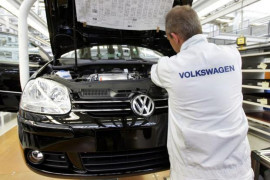
ISLAMABAD:
It does not make sense when one hears that there are only three major auto assemblers catering to the demand of a country boasting a population of over 185 million people.
Despite having a potential market, the auto industry - which has immense backward and forward linkages - seems to have stagnated with limited choice.
The reason, as prospective players articulate, is the liberal import policy that hinders the entrance of new companies.
Hence, these prospective players in the automobile industry, who are expected to enter the arena under a revised policy, have sought a blanket ban on the import of used cars in a bid to protect their investments.
The government is working on a new auto policy for a long time but has been unable to announce it in the wake of pressure from different lobby groups. It kicked off work on the new policy after realising that domestic auto assemblers and manufacturers had created a stronghold and were getting huge sums from consumers in the shape of advance payment.
According to officials of the Ministry of Industries and Production, the import of up to three-year-old used cars under the gift scheme is being misused by the importers.
“Some suggest that the import of used cars should be allowed to all or it should be banned if new industry players make firm commitments that they will set up plants for introducing new car brands in Pakistan,” an official said.
The auto manufacturers of Germany, China, South Korea, United States and European Union have expressed interest in establishing plants in Pakistan, but they want investment protection.
However, the demand may not go down well with the authorities because of heavy import of used cars in recent years and their popularity among consumers due to satisfactory prices, their different designs and shapes.
In order to encourage the potential entrants and ignoring protests from local manufacturers, the government is likely to cut import duty by 22-40% across the board on localised and non-localised car parts for new players under the revised policy in an attempt to break the monopoly of existing manufacturers.
Recently, the Competition Commission of Pakistan also took action against the local car assemblers over allegedly indulging in monopoly practices.
At present, the import duty on non-localised parts - which are not manufactured in the country - is 32.5% whereas localised parts attract a 50% duty.
Under the new policy, the government plans to collect only 10% duty on both localised and non-localised parts of completely knocked down (CKD) kits as an incentive for the new players to create an atmosphere of investment and competition. This facility has been proposed for five years.
The Economic Coordination Committee, in its meeting held on October 12, 2014, had decided to give tariff protection for five to seven years to prospective players in the auto industry in order to break the monopoly of existing assemblers, who were using obsolete technology and selling vehicles at high prices.
The committee also noticed that despite getting incentives from the government, the assemblers were continuing to sell vehicles at high prices. They were also earning hefty profits on the advance deposited by the car purchasers before getting delivery. The ECC members were also not satisfied with the automobile industry’s progress, which had not been recording any growth for many years.
On the ECC’s directive, the Ministry of Industries and the Engineering Development Board are working on a package of incentives for the prospective players to encourage competition, which may result in a decline in vehicle prices.
Under the present mechanism, vendors or in-house manufacturing of parts by the assemblers are allowed import of raw material, sub-components, components and sub-assemblies at 0%, 5%, 10% and 20% duty, respectively.
Published in The Express Tribune, July 3rd, 2015.
Like Business on Facebook, follow @TribuneBiz on Twitter to stay informed and join in the conversation.































































COMMENTS (5)
Comments are moderated and generally will be posted if they are on-topic and not abusive.
For more information, please see our Comments FAQ